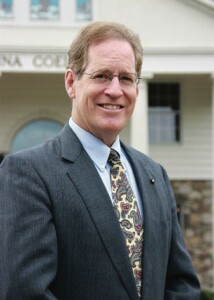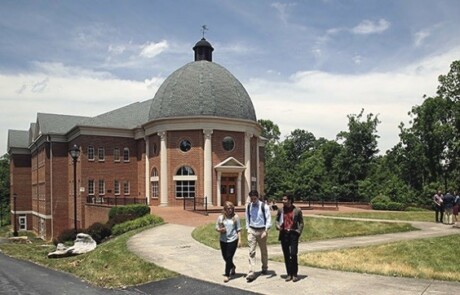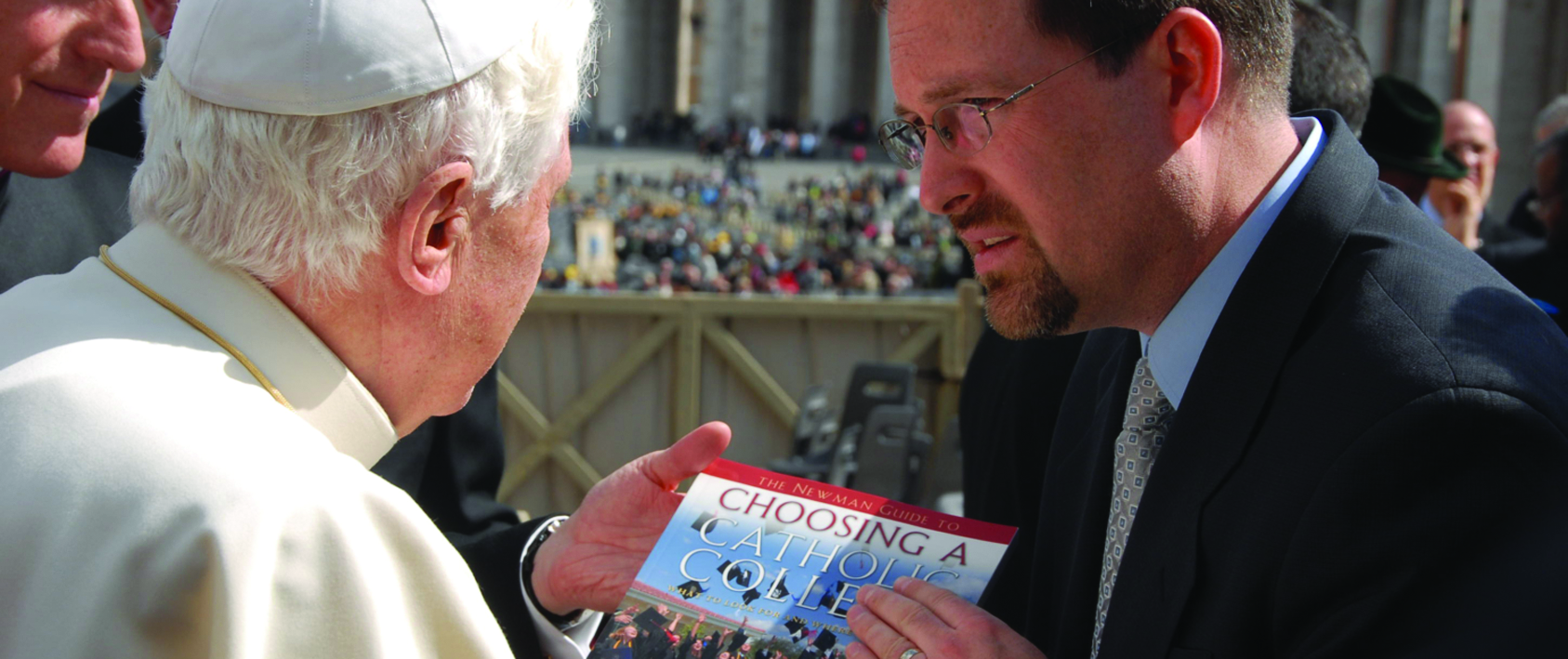
An aerial view of Christendom College, showing the Shenandoah River as it flows by the campus.
By Timothy O’Donnell
In an era that can truly be described as another Dark Ages, it becomes ever clearer the need to loudly proclaim the Kingship of Christ in our culture. There is perhaps no place more important to take on this task than in the field of higher education, where a weaponized secularism is training the next generation not for pursuing the true, the good, and the beautiful, but rather the relative, the sinful, and the ugly.
Thirty years ago, Pope St. John Paul II wrote a roadmap for Catholic universities to follow in our modern times. This document, Apostolic Constitution on Catholic Colleges and Universities, “Out of the Heart of the Church” (“Ex Corde Ecclesiae,” August 15, 1990) is more important than ever to look at, with its beauty and power providing all Catholic universities with a guide that can bring the Kingship of Christ back into our culture.
In this document, John Paul II provided the fundamental solution to the major problems that are afflicting Catholic higher education in this country. During the 1960s, many Catholic colleges felt an acute sense of inferiority to their secular counterparts and began to follow secular models of education. The root of this problem, I believe, was a crisis of faith which led many of the Catholic intellectual elite to become increasingly antagonistic to the magna traditio of Catholic higher education.
Often educators act as if an open mind is the highest perfection. In fact, an open mind lacks perfection, for it is still searching.
As Christians we do not have open minds but rather discerning minds. Our minds are deeply committed to the truth of Jesus Christ. We judge, therefore, all proposed truth within the context of the truth which He has revealed to us. As Cardinal John Henry Newman once said, the education of the young should provide them with a “habit of mind which lasts through life, of which the attributes are freedom, equitableness, calmness, moderation and wisdom.”
A discerning mind using principles of sound reason will not be “open” nor claim that everything is good and everything is worthwhile. The university exists for one specific purpose — to help form and shape the minds of its students in their search for the acquisition of truth.
Above left, the college library, and, above right, student residences
In this noble effort, the cultivation of an appreciation of the good and the beautiful is also crucial, for as John Paul II stated in Ex Corde Ecclesiae, the Catholic university’s goal is “to help students think rigorously, to act rightly and to serve the cause of humanity better.” A Catholic university’s specific task is consecrated to this goal of using the light of faith and sound reason in the service of truth. In uniting these two orders, which characterize so much of what is best in the Catholic tradition, epitomized in the writings of Saint Thomas Aquinas and many other Fathers and Doctors of the Church, there is an openness to the fullness of reality, which, sadly, is oftentimes lacking in the secular model of the university.
The Catholic university is further distinguished from its secular counterpart by its “free search for the whole truth about nature, man, and God.” The Catholic university is open to the whole truth; because of this, it should embrace a “universal humanism” which always examines things in their “essential connection with the supreme truth who is God.” Within the Catholic university, there should never be found a truncated view of reality. Rather, there should be an openness to the fullness of truth, wherever it may be found, whether that truth bears on God, man, or the created order. The free pursuit of truth has always been viewed as a most noble undertaking.
Freedom, however, is not an absolute right that lives in isolation; rather, it is related intimately to the true and the good. As a matter of fact, it is only in freedom’s relation to the true and the good that authentic freedom can be guaranteed and nurtured. This Catholic vision, with its deep philosophical and theological foundations, is not simply a “perspective” or a “view” that is to be made present as one among many different perspectives. Rather, it is a fundamental grounding vision that gives meaning, direction and purpose to all that we do.
John Paul made it clear that he was not satisfied with a university in a particular “religious tradition” but only with one which has an explicit Catholic identity. To this end, a Catholic university must have at least four of the following “essential characteristics.”
First, the Holy Father says there must be a Christian inspiration which is found not only in the individuals who make up the college or university, but throughout the university community as such.
Secondly, in the light of the truths of the Catholic Faith, there must be an ongoing reflection upon the growing body of human knowledge to which the university seeks to add its own unique contribution in the field of research and writing.
Third, within the university there must be “fidelity to the Christian message as it comes to us through the Church.” It is here, particularly within theological discourse, that the necessity of adherence to the teaching of the Magisterium as an authoritative font of truth is emphasized by the Pope.
Fourth, there must be a commitment on the part of the institution to serve the entire people of God and the entire human family of mankind “in their pilgrimage to the transcendent goal which gives meaning to life.” That transcendent goal is none other than God, who beckons all men to eternal happiness in the beatific vision. Here again, in all four points the importance of faith is seen. It is central and vital to the integrity of the Catholic university.
All Catholics should be deeply grateful for the inspired guidance of John Paul II in this document and for Rome’s insistence that it be fully implemented in every institution of higher learning that bears the name “Catholic.” Thirty years later, the need for Ex Corde Ecclesiae rings truer than ever. Catholic universities have only further descended into secularism, confirming the concerns John Paul himself saw at the time of his writing. Despite this, there is still hope for Catholic universities, and for education as a whole.

At Christendom College, the words of Ex Corde Ecclesiae guide every educational decision made, resulting in thousands of alumni who are now going into the culture and working to restore all things in Christ. This is proof that the model does work and can be implemented in our modern times.
Christ is still King. If we can bring Him back into our classrooms again, the proclamation “Viva Cristo Rey” will ring out ever clearer from the next generation and those that follow after them, restoring our culture in the Kingship of Christ.
Timothy O’Donnell, President, Christendom College








Facebook Comments